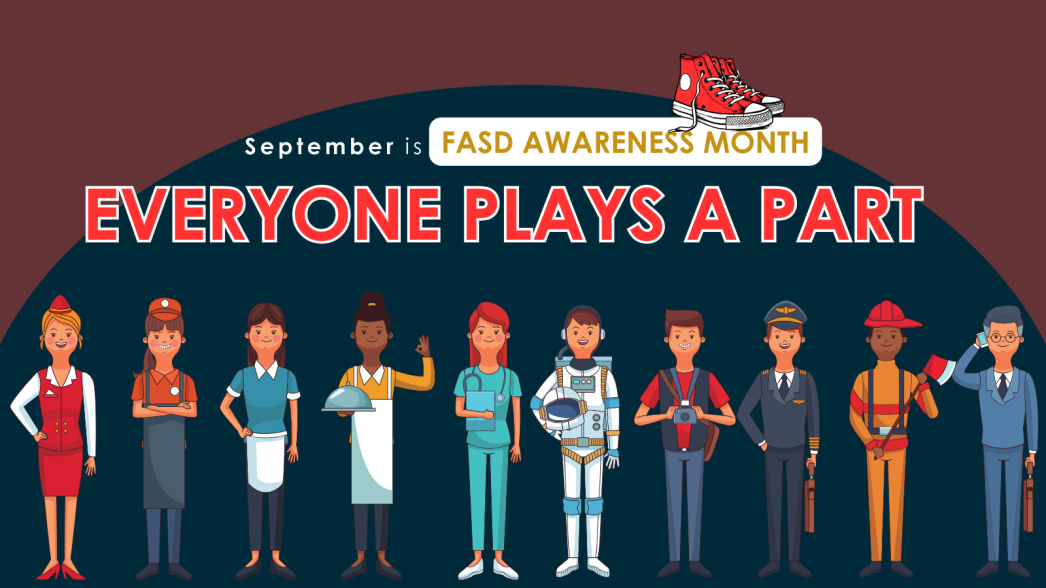Happy FASD Awareness Day! In this blog, we are debunking the myths and answering the most common questions people ask about Fetal Alcohol Spectrum Disorder (FASD).
What is FASD?
FASD stands for Fetal Alcohol Spectrum Disorder. It is a lifelong disability that affects the brain and body of people who were exposed to alcohol in the womb. Each person with FASD has both strengths and challenges and will need special supports to help them succeed with many different parts of their daily lives.
What are the signs and symptoms of FASD?
FASD is a spectrum disorder, so it affects people in different ways. This means that each person with FASD will have their own unique strengths and challenges.
Individuals with FASD are known for having a number of different strengths, including being friendly, likeable, affectionate, determined, hard-working, forgiving, non-judgemental and caring. They also may experience challenges with learning, memory, attention, language, social skills, motor skills, reasoning and judgement, behaviour, and/or academic achievement and they will need specialized supports to help them succeed in these areas.
Can the brain recover from FASD?
FASD is a lifelong disorder. There is no cure, but early and appropriate supports can make a positive impact and improve outcomes for individuals with FASD.
How can you tell if someone has FASD?
You cannot tell if someone has FASD from looking at them. There are also no specific medical tests, like a blood test, that can tell us. In order to determine if someone has FASD they must be diagnosed by a multidisciplinary team of experts.
What is the cause of FASD?
FASD is caused by prenatal alcohol exposure (PAE). People who are not exposed to alcohol during fetal development will not have FASD.
Is FASD preventable?
FASD is preventable if women do not consume alcohol during pregnancy. However, FASD prevention is very complicated . There are a number of reasons someone may drink alcohol during pregnancy, including being unaware they are pregnant, having substance use challenges, experiencing abuse or trauma, and not knowing the impact alcohol can have on pregnancy. In order to prevent FASD, we have to consider all of these factors that influence alcohol consumption and we have to provide support for women and girls to overcome these barriers to healthy pregnancies. When we say “FASD is 100% preventable” we are oversimplifying an extremely complex issue.
Is there any amount of alcohol that is safe to drink during pregnancy?
There is no known safe amount, type, or time to consume alcohol during pregnancy. Experts agree that the safest option is not to drink alcohol if you’re pregnant, breastfeeding, or trying to conceive.
How can I get an FASD diagnosis?
If you are concerned that you or a member of your family has FASD, you should talk to your health care provider about getting a referral to a number of different diagnostic clinics across Canada. The assessment process involves meeting with a diagnostic team made up of several different professionals, including a paediatrician, psychologist, speech language pathologist, social worker, occupational therapist, and clinic coordinator.
If a man drinks, can his sperm cause FASD?
A father’s drinking habits can make a fetus more vulnerable to Prenatal Alcohol Exposure (PAE) and can contribute to FASD. Fathers can have an important influence on mothers’ drinking habits and the healthy development of their babies.
Learn more
To learn more about FASD we recommend taking our Foundations in FASD online course. This is a basic training course intended for everyone that may come into contact with someone with FASD.
Knowledge is power! Taking the time to educate yourself on the existing evidence surrounding FASD can make a huge difference to someone with FASD’s life. This FASD Awareness Day, play your part by improving your understanding of the disability.

